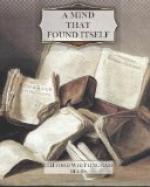XIX
Even for a violent ward my entrance was spectacular—if not dramatic. The three attendants regularly in charge naturally jumped to the conclusion that, in me, a troublesome patient had been foisted upon them. They noted my arrival with an unpleasant curiosity, which in turn aroused my curiosity, for it took but a glance to convince me that my burly keepers were typical attendants of the brute-force type. Acting on the order of the doctor in charge, one of them stripped me of my outer garments; and, clad in nothing but underclothes, I was thrust into a cell.
Few, if any, prisons in this country contain worse holes than this cell proved to be. It was one of five, situated in a short corridor adjoining the main ward. It was about six feet wide by ten long and of a good height. A heavily screened and barred window admitted light and a negligible quantity of air, for the ventilation scarcely deserved the name. The walls and floor were bare, and there was no furniture. A patient confined here must lie on the floor with no substitute for a bed but one or two felt druggets. Sleeping under such conditions becomes tolerable after a time, but not until one has become accustomed to lying on a surface nearly as hard as a stone. Here (as well, indeed, as in other parts of the ward) for a period of three weeks I was again forced to breathe and rebreathe air so vitiated that even when I occupied a larger room in the same ward, doctors and attendants seldom entered without remarking its quality.
My first meal increased my distaste for my semi-sociological experiment. For over a month I was kept in a half-starved condition. At each meal, to be sure, I was given as much food as was served to other patients, but an average portion was not adequate to the needs of a patient as active as I was at this time.
Worst of all, winter was approaching and these, my first quarters, were without heat. As my olfactory nerves soon became uncommunicative, the breathing of foul air was not a hardship. On the other hand, to be famished the greater part of the time was a very conscious hardship. But to be half-frozen, day in and day out for a long period, was exquisite torture. Of all the suffering I endured, that occasioned by confinement in cold cells seems to have made the most lasting impression. Hunger is a local disturbance, but when one is cold, every nerve in the body registers its call for help. Long before reading a certain passage of De Quincey’s I had decided that cold could cause greater suffering than hunger; consequently, it was with great satisfaction that I read the following sentences from his “Confessions”: “O ancient women, daughters of toil and suffering, among all the hardships and bitter inheritances of flesh that ye are called upon to face, not one—not even hunger—seems in my eyes comparable to that of nightly cold.... A more killing curse there does not exist for man or woman than the bitter combat between the weariness that prompts sleep and the keen, searching cold that forces you from that first access of sleep to start up horror-stricken, and to seek warmth vainly in renewed exercise, though long since fainting under fatigue.”




